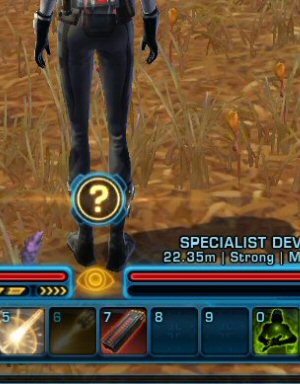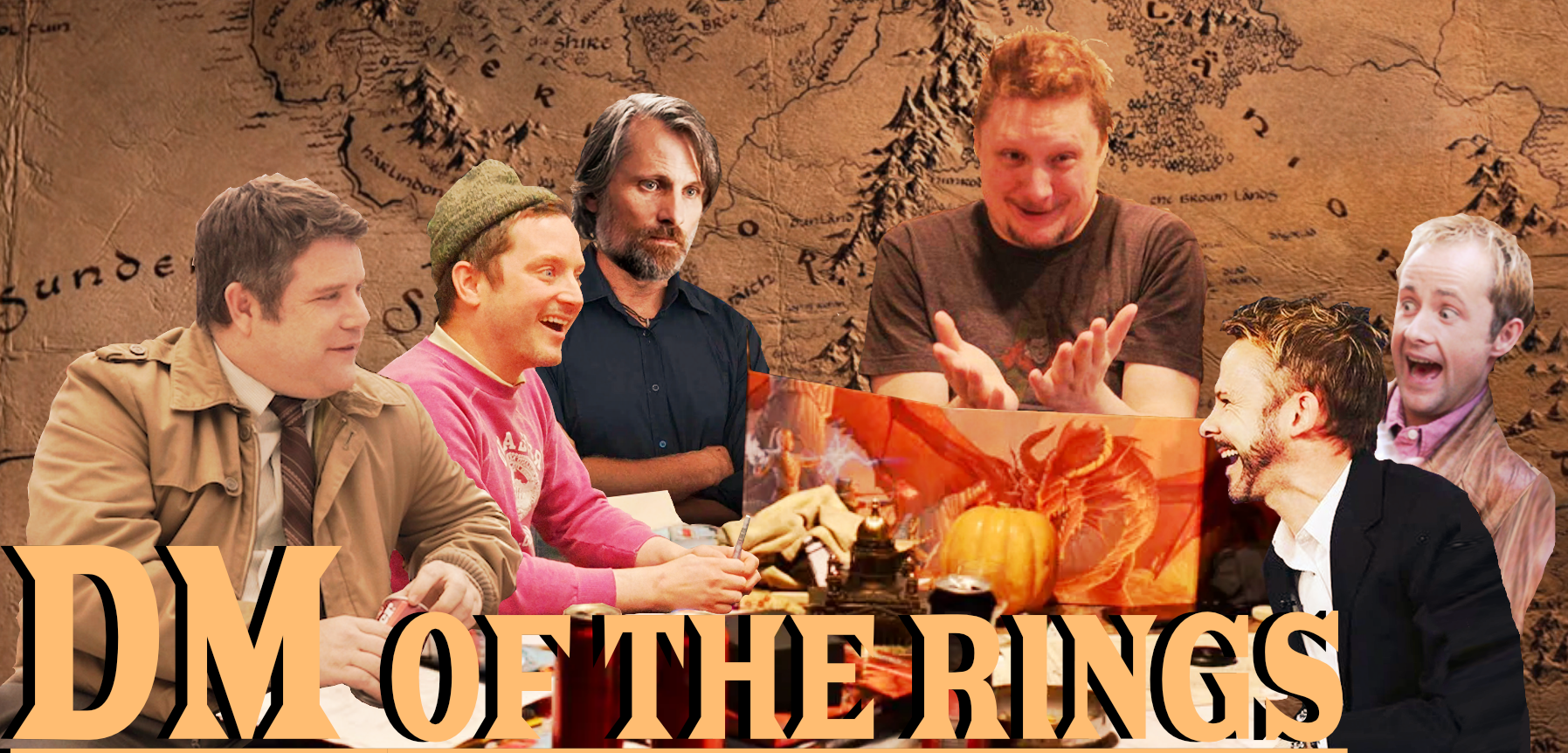.png)
– Shamus, Monday Oct 9, 2006
God, riddles. Our DM once had to entirely forgo a sphynx puzzle because it turned out we were so bad at riddles that we nearly got the entire party killed. Never again.
Game at the Bottom

Why spend millions on visuals that are just a distraction from the REAL game of hotbar-watching?
What Does a Robot Want?

No, self-aware robots aren't going to turn on us, Skynet-style. Not unless we designed them to.
How I Plan To Rule This Dumb Industry

Here is how I'd conquer the game-publishing business. (Hint: NOT by copying EA, 2K, Activision, Take-Two, or Ubisoft.)
Batman: Arkham Origins

A breakdown of how this game faltered when the franchise was given to a different studio.
Silver Sable Sucks

This version of Silver Sable is poorly designed, horribly written, and placed in the game for all the wrong reasons.
 T w e n t y S i d e d
T w e n t y S i d e d

Looks like you posted last week’s again instead of the new one, though the title and description look right.
And there is no Page 16 uploaded so far, unfortunately :/
The riddle is (or was, now that it’s been fixed) what happened to the comic image. Very meta.
Look, it was a really long PHP discussion!
(hoping it’ll get fixed soon)
Gah! Fixed! Thank you!
Yeah… riddles. They’re the bane of every group that has a riddle loving GM. Some game systems let you deal with them appropriately by rolling some dice and succeeding in figuring them out (or just saying “My character knows all the riddles so they solve it”, see Amber Diceless, a game written by a Player who hates riddles), but most are written by riddle-loving taskmasters who demand the Players figure them out.
Read up on that Amber game… can’t believe I missed that back in the day, it sounds like a really unique system and a lot of fun. Was a big fan of the book series as well. Thanks for bringing it up!
It really takes the right people to get into Amber… but when you have that group, ho boy, those are memorable games.
Typo watch: “and and it’s many secrets” should read “and its many secrets”.
I have to admit, I miss the old font.
And I miss the old grey background color of Shamus posts. The new lilac really hurts my eyes.
Sorry, I suppose I was feeling sentimental when picking the background colors for all the writers. That purple was his favorite color. Easily fixed, though.
I was going to say the same thing. It is “its” not “it’s” in this case.
Ah, I forgot about this one, this is a good time. I relate to this one.
In games with lots of options like tabletop or Scribblenauts, it’s a point of pride to always find a non-standard solution to a problem. Just solving the riddle as intended is practically cheating.
This is why I always make my puzzles strictly and overtly optional. Either it protects a trinket, bypasses a combat encounter or has an inbuilt hint system. For example, I designed a puzzle where the answer was a five-letter word. PCs could choose to take on a minor curse in exchange for one of the letters.
Puzzles are high variance (people either solve them immediately or get stuck for hours) and not everyone likes them. Still, it’d be a shame to do away with them entirely.
Personally I’ve never minded a puzzle as long as it’s “fair”. It has to be clear it’s a puzzle. The clues to figure it out should not be unfairly hidden or absent. The penalty for failure shouldn’t be disproportionate. And, most importantly, the puzzle must make sense in context – why is this puzzle here? Who is it for? Who is it hiding something from? How did people so ARENT the party interact with whatever this is? Why CAN’T I simply bypass it?
But depends heavily on the group.
My biggest complaint about puzzles is that they are such an out of game construct a good portion of time. Along with that, many characters have Intelligence as a dump stat, so them coming up with the answer seems very much out of character.
I remember a puzzle in White Plume Mountain using something like Prime Numbers. In a fantasy world, it seems unlikely that this is a concept hardly anyone would know. Not like mathematics beyond basic counting is a required course for D&D teens like the real world.
A 3.5 adventure called “The Ettin’s Riddle” was based around the characters understanding a reference to the Cleric…based upon the class description in the Players Handbook.
Yeah, ye olde dumb Characters, smart Players issue. I solve that by feeding all my smart stuff over tot he Wizard or other high IQ/WIS PC to use when I’m playing a dumb ole meatshield.
This. It honestly requires a very particular set of circumstances where a riddle or a puzzle is a reasonable obstacle and on top of that there would be hints in the immediate area. Skyrim of all things tried to lampshade it with the claw keys and the “rotate the rock to pick a symbol” puzzles with the solution literally carved into the walls of the room by claiming this was meant to work against the undead.
Generally a literal riddle as a security measure can make a bit of sense if it’s a “call-response” thing. Like, an example I remember is correlating geographical directions with the elements, but then it needs to be something that only a limited set of people would know, and the answer must not be readily available at the riddle’s site, because if everybody in the whole wide world associates West with fire than everybody in the whole wide world will be able to figure it out making it ineffective, and if it is something only a limited set of people knows it again becomes a thing that characters either know or not: roll for Int to remember which of the seven holy numbers is associated with each of the tentacles of the Great Tentacled One by his cult.
My personal pet peeve is when puzzles are considered some kind of measure of moral or ethical worthiness. Slide these blocks into the colored spots to prove you are worthy of receving the divine blessing!
To be fair to the players, the setup here is pretty dumb if this was a real game.
Because it’s not really a puzzle. It’s not obviously presented as a riddle. Even in the book, Gandalf himself doesn’t realize the inscription is actually a clue to the right answer right away.
The way this is set up is that the players don’t know the password, and don’t have any obvious way to get it. So yeah. They’re looking for plan B. What else would they do.
The setup here in character is dumb. The NPC who tagged along explicitly to guide you actually knows the password, but petulantly won’t tell you it or use it himself or even LET ON that he knows it unless you ask nicely? And the GM solution is to hint out of character at this absurdity?
The way it actually worked in the books would be hard to roleplay, since it relies on Galdalf having known but forgot the password, which would be very hard to do with an NPC. I guess rolling a wisdom or some kind of Dwarven Lore check might work (and be a lot less stupid than how the GM plays this…)
I think it can kind of work with an NPC as a fallback measure. Either the players figure out the answer or it will take the archeologist d10 rounds to find it in their notes while the players have to fend off mummies.
Also, “Burn it” is a GREAT answer. Built a large fire before the stone. It will start to crack. Throw water on it. More cracking. Eventually the stone will crumble (wedges and mining tools will of course help). Surely the dwarf in our party would know how to do this.
To bad this trick doesn’t work on that door in Neverwinter Nights 2.
Oh my Nuffle THAT DOOR.
I was annoyed by it before the article pointed out why i was annoyed, now I can’t ever replay the game because that damn door
The door is terrible, but the game does “numbers go up” really well, and I liked the castle building, so its a win for me in the end in spite of door.
The castle building is after the door though!
This can be expanded to puzzles in general: there are a lot of ways to do them at the tabletop, most of them wrong. David J. Prokopetz wrote a few pieces on running TTRPG puzzles here and here (with a couple of amusing anecdotes in this part of the latter’s reblogs).
French Translation available here:
https://dmoftheringsfr.blogspot.com/2023/04/puzzle-moi-ca.html
Cryptic crosswords are a good source of riddles. One of my favourite riddles to use is “Long story about eldritch leader” (Answer:
YEARN. YARN is another word for story. “eldritch leader” is “E” – the first letter. YARN is about the E, as in the letters surround it. YEARN is another word for long – as in, to long for something.). They’re not the classic riddle format, but I find they work well. It relies on the players knowing – or being able to deduce – how cryptic crossword clues work though.Bad sources of riddles include asking ChatGPT or DuckDuckGoing “D&D riddles”. You either get unsolvably bad riddles or they’re so famous that there’s no mystery to them (“What has four legs in the -?” “Man!”)
Riddles are the best friend of railroading GM because they work like they think TTRPG work, you have one acceptable way to continue the story and the player’s job is to guess it, nothing else.
That’s why for proper TTRPG you present players with a problem to solve and improvise based on the solution they find, sprinkling adversity and consequences as the pace and logic requires.